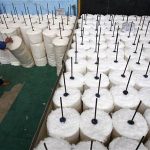By Louis Charbonneau and Michelle Nichols
UNITED NATIONS (Reuters) – Nigeria’s “robust” approach to neutralizing a threat posed by Islamist sect Boko Haram using military force, holding indirect talks with the group and improving education in the north is paying off, the Nigerian president said on Wednesday.

Boko Haram, which wants to carve out an Islamic state in northern Nigeria, has been blamed for more than 1,000 deaths since its insurgency intensified in 2010. The United States has designated three of Boko Haram’s senior members as terrorists.
In an interview with Reuters on the sidelines of the U.N. General Assembly’s annual gathering of world leaders, President Goodluck Jonathan also played down the significance of the government forces’ killing of the sect’s spokesman, Abu Qaqa, in a gun battle in Kano on September 16.
“If I look at it, the trend is coming down,” he said about the threat posed by Boko Haram. “It’s not because Abu Qaqa is dead. Abu Qaqa is just one person. If one Abu Qaqa dies, it can generate 10 Abu Qaqas.
“The issue is not the death of one person,” Jonathan said. “The issue is that the robust approach that government is taking, exploiting all possible means … is paying off, and we believe it will continue to pay off.”
Nigeria’s military has been accused of using heavy-handed tactics in the past and previous operations targeting Boko Haram have resulted in civilian deaths. But Jonathan made clear that the military approach could only be one part of the solution.
Much more important, he said, was a push to improve agriculture, job prospects and access to Western-style education in the predominantly Muslim north.
“The whole approach, both the security aspects, both the indirect talks, and the job opportunities that we are creating. We are giving hope to the people. The education institutions we are establishing are giving hope to the people,” Jonathan said.
“One links up with the other to get to the respite we are seeing now,” he said. “I cannot credit it to only one approach.”
This week, Nigeria’s military said it killed 35 members of Boko Haram and arrested several during an overnight gun battle in Damaturu, capital of northeastern Yobe state.
Jonathan’s spokesman said last month that Nigeria’s government was reaching out to Boko Haram and talking with some of its members via “backroom channels” as it seeks a peaceful way out of the north’s conflict.
SOVEREIGN WEALTH FUND
Wearing his trademark wide-brimmed black hat, Jonathan also spoke about the Nigerian government’s plan to put oil revenues into a sovereign wealth fund, a move state governors vowed last week to go to court to prevent.
“Yes, we can go to court. But we believe it’s not the best to solve certain problems through a court,” he said. “We are discussing, and I believe at the end of the day we will get to a point where both parties will win.”
Africa’s top crude producer has been moving closer to joining its OPEC partners in creating a sovereign wealth fund for long-term investment of its oil cash.
“They are not arguing because they know that the issue of the sovereign wealth fund is transparent, they trust the minister of finance,” he said.
“They feel that some of the states have challenges and they want to decide what percentage they can put in. But we feel no, it’s better we do it collectively.”
Jonathan also talked about his push to abolish a much-criticized fuel subsidy. He tried to halt the subsidy in January but had to reinstate it partly in response strikes.
“Besides the issue of corruption, it was being abused,” he said. “All over the world, people advised that states should no longer subsidize hydrocarbons, because when you subsidize hydrocarbons, those who gain are not the ordinary people.”
“Quite a lot of Nigerians agree that subsidies must go,” he said, adding that he expected to again try a gradual phase-out to soften the impact of price increases. “This time around we will properly involve the people and give a robust timeline.”
Nigeria’s cities are expected to add 200 million people by 2050, more than doubling the country’s current population, the United Nations forecast in April. But Jonathan said he was wary of forecasts based on current trends and suggested that the country’s population growth would eventually slow down.
“That (growth forecast) is based on the present statistics in terms of a pattern of reproduction, which may not continue that way,” he said. “As more people become more educated and more aware, they tend to reduce the size of their population.”





